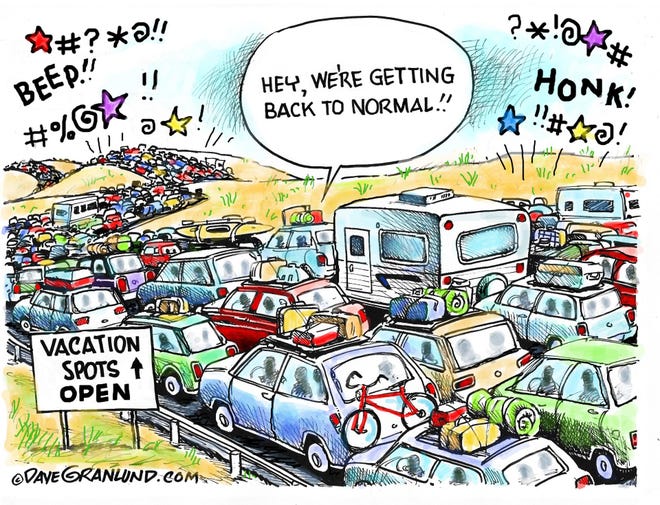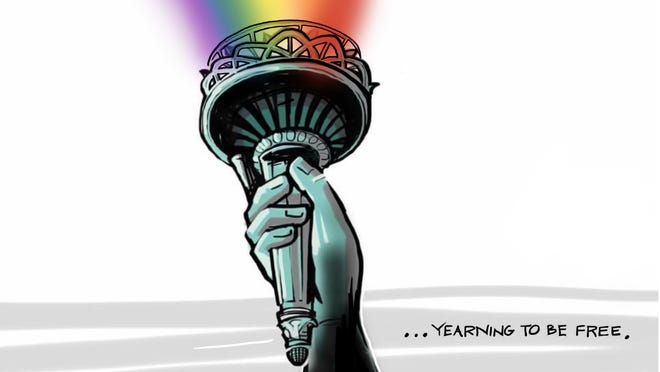In today’s fast-paced news environment, it can be hard to keep up. For your weekend reading, we’ve started in-case-you-missed-it compilations of some of the week’s top USA TODAY Opinion pieces. As always, thanks for reading, and for your feedback.
— USA TODAY Opinion editors
By Scott Douglas Gerber
“It is profoundly disturbing that Naomi Osaka felt compelled to withdraw from the French Open, one of tennis’ four Grand Slam tournaments. It is also illegal to make her feel like she needed to withdraw. The 23-year-old Osaka is the No. 2 female tennis player in the world at the moment. She won the previous two Grand Slams, and she has won a total of four in her young tennis career.”

By Connie Schultz
“Pride Month always stirs up a lot of memories for me. They float up like snapshots, a collection of captured moments in time: My daughter’s gay high school guidance counselor insisting that she is worthy of her dreams. Holding my breath as people recite long lists of names of friends and loved ones who have died of AIDS. Pastor Kate officiating at our wedding, even as she is legally forbidden from marrying Jackie, her longtime partner in the front pew.”
By Jonathan Turley
“Gen. Michael Flynn appears to be man adrift. Flynn was pummeled by prosecutors to the point of bankruptcy and subjected to serious errors in prosecutorial and judicial misconduct for years. Despite my criticism of his prosecution, however, some of us noticed a rise of unhinged and undemocratic rhetoric from the former national security adviser.”
By Jennifer Grosshandler
“I can still feel the rough spots of asphalt underneath me, balanced on one knee, fingertips on the ground. I remained as still as possible, razor focused, ready to sprint. I was at the net, my gaze set on that white band at the top, not daring to look to my left as one of the world’s most celebrated tennis players, Chris Evert, served an ace. It was the mid 1970s. I was eight years old and had been playing tennis half my life.”

By Mike Hayes
“Today, on Memorial Day, when people say, “thank you for your service,” it’s a beautiful way to tip their cap to the 1.2 million people actively serving in the armed forces, or our 20 million veterans. But it’s also insufficient. Memorial Day shouldn’t just be a day to remember. It should be a day to change our understanding of service. It should be a day to realize that we are no different from the rest of you. We possess no special gift that makes us uniquely able to give back. We should not just be thanked for our service. We should be joined.”
By Fay Horwitt, Lanessa Owens-Chaplin and Trevor Smith
“Pop culture has made Tulsa, Oklahoma, and the violence that destroyed its Greenwood community the center of conversation in ways that it never has been before. The HBO series ‘Watchmen’ kicked off with a vivid re-enactment of the massacre. The comic book series ‘Bitter Root’ features the massacre as its heroic characters fight racism. But Greenwood wasn’t the only Black Wall Street in America, and mass violence wasn’t the only means of wiping them out. Urban renewal and redlining tore apart many Black neighborhoods, along with their promises of progress and economic freedom.”
By The Editorial Board
“There’s good news about the COVID-19 vaccines almost daily. New research shows immunity from the shot could last years, perhaps a lifetime. And all major vaccines – Pfizer, Moderna and Johnson & Johnson versions in the United States – appear effective against most feared, emerging variants, according to the Centers for Disease Control and Prevention.”

By Dr. Peter Hotez
“Our best hope of slowing or even halting COVID-19 virus transmission is through vaccination. Based on our earlier studies, we will need about three-quarters of the U.S. population vaccinated to achieve this goal. But with more transmissible variants, we may need to vaccinate just about all American adults and adolescents. In regards to current vaccination rates, we are making good progress on the East and West Coasts, but in the Southern United States and in Idaho and Wyoming, vaccine coverage remains low.”
By Tom Wilber
“Six years ago, on Memorial Day, I helped my dad assemble the many pieces of his service dress white uniform. As retired military, the local organizer had asked us both to ride on a float in our hometown parade. Why us? We represented two successive generations of naval careers. Before leaving for the parade, Dad and I stood side by side for photos with the things that we carried. I held the remaining piece of his F-4J aircraft that I had collected two weeks earlier, in a village in Nghe An Province in north central Vietnam, where Dad’s burning fighter plane had crashed in 1968. The engine piece had spent decades re-purposed as a pot to hold flowers for Tet, the lunar new year family holiday in Vietnam.”

By Suzette Hackney
“Because there shouldn’t be any stigma attached to mental illness. It’s a message that Americans must embrace beyond Mental Health Awareness Month. It’s so important, particularly during pandemic recovery, that Jim Irsay, billionaire owner of the Indianapolis Colts, created a Kicking the Stigma family initiative and raised more than $4.5 million this month to help generate awareness about mental health disorders and expand treatment options and resources. Irsay said the initiative was the brainchild of his three daughters, Carlie, Casey and Kalen. Conversations around mental health and wellness and equitable access to treatment is the first step in helping people realize they are not alone in the struggle.”
By Eileen Rivers
“Most people probably haven’t heard of Linnentown – a small community in Athens, Georgia, whose 22 acres of shotgun houses and tree-lined streets were bulldozed in the 1960s, replaced by dorms for students at the University of Georgia. Linnentown, like so many other Black communities of that decade, was destroyed by urban renewal. The city sold it for the equivalent of $1.8 million. But this year, Athens-Clarke County became one of the latest in a handful of municipalities to recognize the suffering of residents like Hattie Thomas Whitehead, who grew up with six siblings in Linnentown. Her parents lost the only home they would ever own, she explained in an interview with Grant Blankenship of Georgia Public Broadcasting.”
By Jill Lawrence
“The successful Senate filibuster blocking an independent, bipartisan commission to investigate the deadly Jan. 6 attack on the Capitol should not be viewed as just another round of dysfunction. Barring shocking displays of procedural courage by Democrats or political courage by Republicans, it is a preview of massive failures to come in the project of trying to preserve American democracy. ‘I’m deeply disappointed,’ Rep. Lee Hamilton, a Democrat who was vice chair of the 9/11 Commission, told me. He called the Jan. 6 riot ‘a very dark day in the history of our country. We came very close to losing our republic and our form of government. Obviously Congress should investigate.'”








